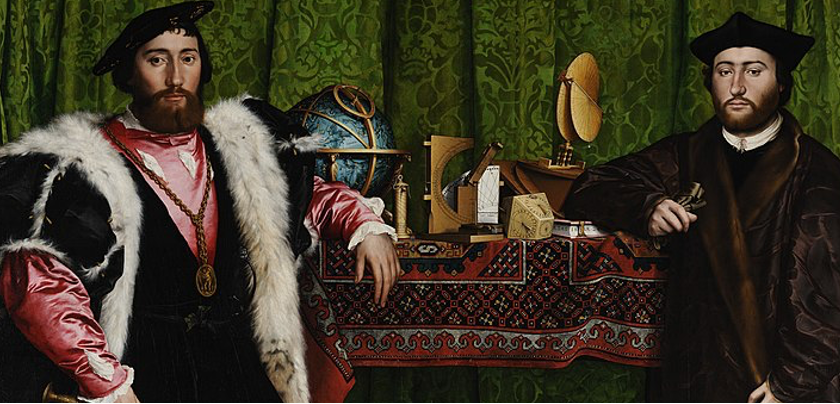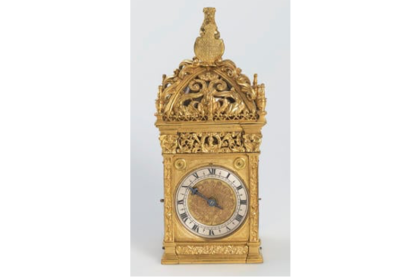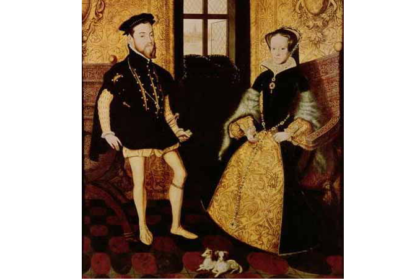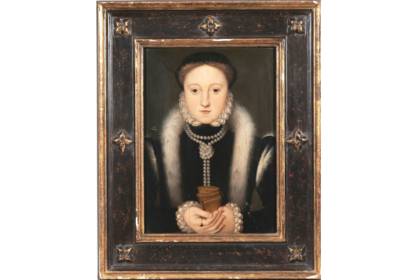François Van der Delft served as the Spanish ambassador to the courts of Henry VIII and Edward VI. In this capacity, he had a certain degree of responsibility over any Spaniards residing or travelling through England. In 1545-1547, Van der Delft was called upon to investigate an interesting case whereby a Spanish ‘comendador’ was imprisoned under suspicion of operating under false papers and espionage. You can read here the letters, primarily between Van der Delft and Emperor Charles V, which reveal how the affair came to light, and how it was concluded.
~~~
21st Dec. 1545 – Van der Delft to the Emperor.
This day the Lords of the Council have sent to me as they say by command of the King to inform me that there lately arrived here a Spanish comendador with letters of recommendation from the Duke of Alburquerque in order that this King might receive him in his service. The letter also stated than in consequence of a dispute he had had with another gentleman of your Majesty’s household, he had found it advisable to leave your service, he having filled an office in your chamber; and in consequence of your Majesty’s displeasure he had been commanded to live on his commandery in Spain. As he had not found favour with the Prince (Philip) he had withdrawn himself from Spain and had come hither. It appeared to the Council that this letter was a forgery; as the comendador had called himself by divers names, Don Pedro Pacheco in one place, Don Pedro de la Cueva in another, and Herrera in a third, his own servants not rightly knowing what to call him; and the Council consequently did not know what to think of him. Their doubt was increased by the fact that a French gentleman, who has recently joined this King’s household, named M. de Bertheuille, otherwise Fontenay, had advised them that when your Majesty was before St. Disier, this comendador had carried on intelligence with him (Fontenay) and certain other Frenchmen; giving them much secret information about your Majesty’s camp. The Councillors therefore gave me the above information in order that I might tell them my opinion about it. The King was inclined to send him back whence he came as he was a subject of your Majesty; only that he feared by this information that he might have done some other disservice or disloyalty and he therefore preferred, if I approved of it, to keep the gentleman by fair means, until I had time to report to your Majesty. I replied thanking the King and Council, who I said were so sage and prudent that they well knew the sort of person this must be. I had, I said, some knowledge of this comendador, who although he had only come to see me two or three times, I soon found to be shaky in his words (vacillant en ses parolles) and I thought the King would easily find as good servants as he would be. With regard to their intention to keep him till I reported to your Majesty, I approved of it and I would write on the subject. I now humbly do so and beg for your good commands.
In case the person of this comendador may be unknown to your Majesty in consequence of change of name, I may say that in the course of conversation he told me that he was sent twice by your Majesty to the King of France about the ransom of Count William of Furstenberg. I also gathered from his talk that he had long lived in France.
~
7th Jan. 1546 – The Emperor to Van der Delft.
We have received you letter of 21st ultimo, and have heard what you wrote to Granvelle in conformity therewith, respecting the Spanish personage referred to. Having considered your communications on the subject, it appears to us that, in any case, the King of England has acted kindly and straightforwardly in informing you through his Council of their impressions of the individual. Having regard to the prevarications of the man, his going thither cannot be otherwise than suspicious; and also that the letter he has presented from the Duke of Alburquerque must be false; since it cannot be possible that the duke would recommend one of our subjects to undertake anything away from our jurisdiction and without our knowledge. If the personage in question be a gentleman, as he affirms, and he says that we had cause to be displeased with him, and consequently ordered him to remain under arrest in the monastery of his order, it would seem as if it must be Don Pedro Portocarrero; who, having committed an outrage on a Spanish gentleman, was ordered by us to be carried a prisoner to the monastery of Uclés. His relationship with the Cuevas and the Herreras, may have given him an opportunity of changing his name; but his statement that he was sent by us to France respecting the release of Count William of Furstenberg is absolutely untrue, with regard to Portocarrero or any other Spaniard. It is obviously impossible in the case of Portocarrero; because he was made prisoner long before we entered France. It is also untrue what you are told by the Frenchman Bertheuille, who is in the King of England’s service, to the effect that he obtained information in the French interest, from the personage in question, respecting what went on when we were before St. Disier. We write you this in detail to put you into possession of all the problems touching this man; and we have thought well to send to England a Spanish alguacil, who is acquainted with Portocarrero, to ascertain whether this man be he, or not.
Whoever he is, he has given ample reason for detaining and interrogating him, to discover his identity. Whilst thanking the Council for the kindness and uprightness shown by the King and themselves in the matter, you will beg them on our behalf to arrest the man, and have him examined in your presence, so that the questions that you consider advisable may be put to him, in view of what we have written above. If he turns out to be Portocarrero you will arrange for the Spanish alguacil to be allowed to hand him the letter he bears, and to command him in our name to return to the monastery. If he proves to be some other person, let him be detained until you have communicated his replies to us; and ask the lords of the Council to let you have the letter he presented from the Duke of Alburquerque; so that we may know whether it is a forgery or not. You will do whatever else you consider necessary in the matter.
Utrecht, 7 January 1546.
P.S.—Since writing the above we are assured that the Spanish gentleman, who has gone to England, is not Don Pedro Portocarrero, but a certain Don Pedro Pacheco; who is a tall, thin, dark person. It is asserted by a man formerly in the Spanish infantry, who has recently arrived here, that this Don Pedro Pacheco passed through France from Spain. We have therefore decided not to send the Spanish alguacil, but we despatch the above letter to enable you to make up your mind as to which of the two persons mentioned is the one in question. If it be Portocarrero you will hand him the letters for him we now enclose. You can obtain information about him from Colonel (Maistre de Camp) Guevara, who is said to be in England; or from some other of the Spaniards there. You will let us know what you can learn, and the reason for the going of this personage to England.
~
9th Jan. 1546 – Van der Delft to the Emperor.
In accordance with the instructions contained in Your Majesty’s letters of the 20th ultimo, I have given to the bearer thereof, the gentleman sent hither by the King of Portugal, all the support and assistance I am able; and I understand that he will be successful in his mission. Since I wrote to your Majesty on the 21st ultimo, respecting the Spanish Comendador, who has come hither, about whom the Council communicated with me and proposed to secure him, the person in question has been placed in good safe keeping. I have also spoken with the French gentleman Bertheuille, who accuses him, from whom I have learnt that the Comendador gave him information of all that passed in your Majesty’s camp before St. Dizier, and that shortly afterwards the Comendador solicited him for an allowance from France. The Comendador was captured by a troop of light horse, his own horses being burdened with his baggage; and, after having been conducted before the Admiral of France, was at once set at liberty. I have thought necessary to inform your Majesty of this, pending your Majesty’s instructions on the matter, for which I am daily asked.
~
17th Jan. 1546 – The Emperor to Van der Delft.
We received yesterday your letters of 11th instant. You did well in assisting the gentleman sent to England by the King of Portugal; and we recommend him to your further good offices if he should need them.
With regard to the Spaniard, who styles himself a comendador, we have written you our instructions. The more enquiries we make here about him, the more certain it appears that he cannot be Don Pedro Portocarrero; and it will be necessary, therefore, to look more closely at the assertions made by Bertheuille, and to endeavour to get to the bottom of the mystery. You will keep the matter in hand, and cause the Spaniard to be detained until you receive our reply to your communication touching the contents of our former letter. We have caused the English Ambassador here to be spoken to on the subject; and we suppose that he will already have written about it, and will do so again. You will do well to make all possible enquiry about the courier who has been lost; and also to let us know everything you can discover respecting the treaty between England and France. We shall be very glad of all the information you can send on the subject.
~
19th Jan. 1546 – Van der Delft to the Emperor.
I have received to-day your Majesty’s letter of the 7th instant, enclosing a note instructing me to obtain further information, about the Spaniard detained here, respecting whom I wrote to your Majesty; and to discover whether he be Don Pedro Portocarrero or Don Pedro Pacheco. I will do so with all diligence, and will duly report to your Majesty. As, however, this Courier is about to start, I think well to inform your Majesty, that the description of the personage named Don Pedro Pacheco, who passed through France, differs entirely from that of the prisoner here; although the latter assumes the same name. The prisoner is a man of medium height, rather short than tall, and stout, with an ordinary colour, without being very dark.
In order to learn the appearance of Don Pedro Portocarrero I have just sent to the Spanish Colonel (Maestre de Campo) named Gamboa, whose description of him agrees somewhat closely with that of the prisoner. It will therefore be necessary to examine him, as your Majesty orders. Whether he be Portocarrero or not, it is certain that once when the Frenchman Bertheuille and he came to dine with me, he (the prisoner) stated in conversation, without contradiction from Bertheuille, many things that happened in the French camp whilst your Majesty was before St. Disier; and Bertheuille frequently appealed to him for confirmation as an eyewitness of matters he related, he having been in the camp after his capture by the French. But your Majesty will learn the truth by my next letter.
~
25th Jan. 1546 – Van der Delft to the Emperor.
As I informed your Majesty on the 19th instant I received on that day your Majesty’s letter of the 7th respecting the Spaniard detained here, and on the morrow I sent to the Council, who were at Hampton Court, nine miles from here, where the King has been staying since Christmas, to say that I had received a reply from your Majesty and I should be glad if the prisoner were examined in my presence. I should therefore thank them to inform me when and where they wished the examination to take place, either at Hampton Court or here in London. I would attend at either place; and would have now gone personally to see them and thank them for their kindness in this matter, in accordance with your Majesty’s orders, only that I did not wish to trouble them, especially as I know the prisoner was not at Hampton Court but in London. They replied that they had several charges against the prisoner, both on behalf of your Majesty and of that of their own King, and as they had only two days before placed him in greater security (I understand in the Tower of London) and the King was returning to London this week, they thought it would be better to defer the examination until they arrived in town. I will act in the matter as your Majesty orders, and will duly report as soon as the examination takes place.
Since taking the above step I have received your Majesty’s letters of 17th instant, replying to mine of the 9th, and I note your Majesty’s orders that I should press to the last for the restitution of everything captured by Renegat. I will act accordingly, but the scruples I encounter in the matter are duly set forth in my letter to M. de Granvelle, in order not to trouble your Majesty with them.
~
17th Feb 1546 – Van der Delft to the Emperor.
Since my last letters of 25th utlimo the King, having returned from Hampton Court to Greenwich, the Lords of the Council ordered one of their secretaries to examine in the Tower the Comendador, who is a prisoner there. The various interrogations were first submitted to me by the Secretary, and as I saw that they were based on statements of the Frenchman Bertheuille, as to what had passed between them to the prejudice of your Majesty before St. Dizier, I thought well to precede them by an enquiry as to the man’s name, quality, parentage and birthplace, his reasons for coming hither, the length of time he was in your Majesty’s service, and with what object he had told me that he had been sent by your Majesty to the King of France about the ransom of Count William (Furstenberg). One of my people was present at the examination. The prisoner replied to the first question that his name was Don Pedro Pacheco, son of Don Juan (Pacheco) of Toledo, his mother being a la Cueva. He said he had been a comendador of Santiago for ten years, and had come hither to serve the King. He had been a gentleman of the table to your Majesty for about six years, and of the chamber three years afterwards, until he had a combat in your Majesty’s Court with one Gerard Caralcero. In reply to the question whether he knew Don Pedro Portocarrero, he said that he did; and that Don Pedro was now in Spain. With regard to his statement to me about Count William, he said he did not recollect it. In reply to the interrogations of the Secretary he denied everything alleged, and said that he had no acquaintance with Bertheuille before he was taken prisoner. I therefore asked the Lords of the Council what they intended to do. They replied that they intended to confront him with Bertheuille; and that I should be pre-advised of what was done. They would also have handed me the letter from the Duke of Alburquerque (which they believe to be a forgery), but the man who had charge of it is absent. When he returns I will send your Majesty the letter in question; and report what takes place with Bertheuille.
~
12th June 1546 – The Duke of Alburquerque to Henry VIII.
A soldier who was formerly a servant of mine arrived yesterday from England, and told me that when he left there, there was a Spaniard imprisoned in the Tower of London, who claimed to be a cousin or a nephew of mine, and who, to give colour to his falsehood, brought letters ostensibly from me begging your Majesty to favour him. These letters having been thought genuine, the man has been well received and admitted to your Majesty’s presence. I am, and shall always remain, grateful that your Majesty considers me so faithful a servant as for you to extend your favour to anyone bearing a recommendation from me; but I can assure your Majesty that in this case I did not write the letter, which is a forgery effected in order to prejudice your Majesty. The greatest favour that can be done to me in the matter is that the man should be severely punished as a warning to others not to go to England as spies under cover of my name and signature. Your Majesty may be perfectly certain that such persons will never be accredited with genuine letters of mine, for I am the last man to countenance with my aid anyone capable of going to England to the disservice of so good a friend and brother of my King, by whose orders I served your Majesty to the best of my ability. I am not surprised that the French should have invented this device to deprive me of the reward that my service merited, for they have shown their resentment against me for my action in the campaign by their treatment of me in the matter of my property; but I wonder that anyone in England should have so bad opinion of me, as to think that I could send a kinsman of mine on so evil an errand.
As the Spaniard in question was rogue enough to bring a forged letter bearing an imitation of my signature, it is possible that others may have carried thither similar forgeries for various objects, and I therefore think necessary to assure your Majesty that the present is the first letter I have written to you since I left your realm. I have refrained from doing so, because I am aware that frequently monarchs are pestered with letters from those who have served them, even though the latter are as powerless, as I am, to serve them again; though in my case, to be sure, the will is not wanting, and no journey would seem too long for me to take, if I could be useful to your Majesty, and had permission of my own King to serve you.
I have received news of your Majesty’s recent victories, which have rejoiced the hearts of your servants, etc. etc. Cuellar, 12 June 1546.
~
1st Aug. 1546 – Princess Mary of England to the Duke of Alburquerque.
Monseigneur. I have received your letters dated 12th June, and have learnt from them, and from the report of your messenger, your position and good health; whereat I am much rejoiced. I am myself so afflicted by illness, as to be unable to answer your letters with my own hand: and I therefore must beg you to excuse this short letter, written by another for me. With regard to the Spaniard of whom you write, I think that your servant will be well informed of the case: and will take you a faithful account of it. I end my letter praying God to give you a long and happy life. Written at the palace of the King, my sovereign lord and father, at Westminster, 1 August, 1546.
Signed, Mary, Daughter of England.
~
3rd Nov. 1547 – The Flemish Council of State to Van der Delft.
We are also sending you herewith the deposition of a Spaniard, who has, according to his own account, come hither by way of England, and there frequented your apartments. We shall be glad if you will inform us what knowledge you have of this man, and if you were told of his imprisonment and know the cause of it. This is to enable us to discover whether he is such as he says.
~
12th Nov. 1547 – Van der Delft to the Emperor’s Council of State.
Touching the deposition of the Spaniard which your Lordships send to me, really, to tell your Lordships the truth, I can assure you that there is not a single word of truth in it, except that I am subject to attacks of gout which sometimes trouble me for four or five days, from which, however, no one suffers but myself. In order that your Lordships may be thoroughly informed of what passed here with this Spaniard, I enclose herewith extracts of what I wrote to his Majesty on the subject, and the replies of the Emperor to me. Since his Majesty wrote to me I continued to insist that the man should not be released without his Majesty’s consent, and I was promised that he should not be. But for the celebration of the King of England’s coronation all the prisoners and malefactors of the realm were granted their pardon and I could not prevent the liberation of this Spaniard, who remained here detained for the costs. For some reason unknown to me, he wished during this period to come often to my house, which I would not permit him to do, both on account of the displeasure he had done to the Emperor, and for the suspicion I entertained that he wanted to ask me to give him pecuniary assistance, as all the other subjects of his Majesty do here, whereby I am grievously burdened and annoyed…
There was, moreover, no reason to admit the Spaniard (to my house) as the Duke of Alburquerque, from whom he presented a letter here, wrote to me saying that he had not given nor signed any such letter, and did not even know such a person. Spain, he said, was a large place, and there were many scoundrels in it, as there were in other countries. The Duke also wrote to the King (Henry) to the same effect, and to all the gentlemen of his acquaintance here, as the letters themselves will prove.
~~~
This is the last we hear of the matter. What steps the Flemish Council took against Pacheco is unknown, though perhaps the answer does lie somewhere in a dusty archive.





